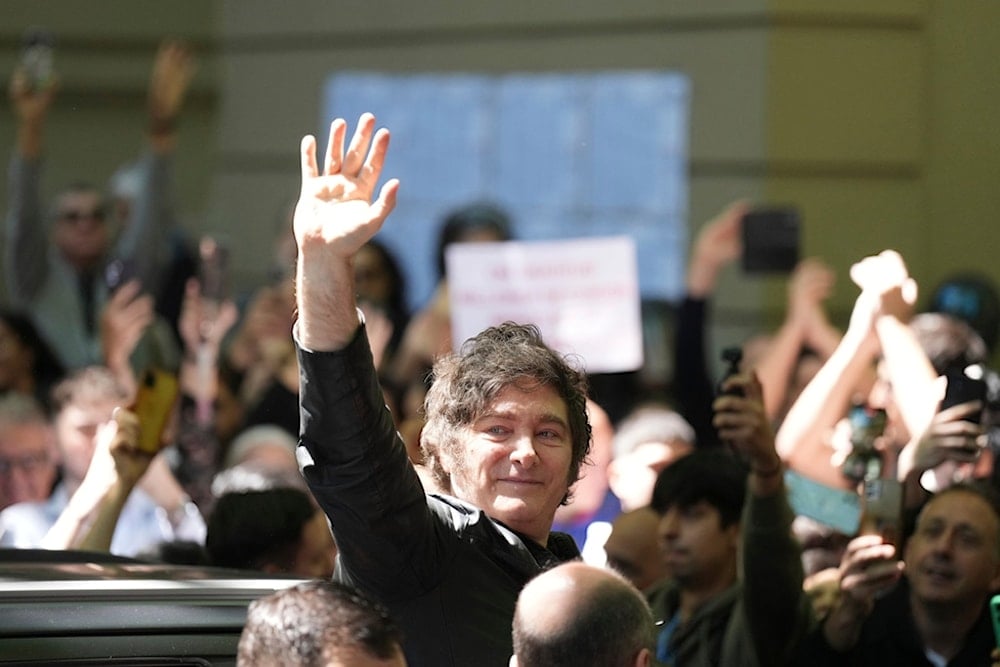Trump-backed Milei wins big in Argentina amid US bailout deal
Javier Milei secures a sweeping win in Argentina’s midterms after his Trump-backed US bailout raises fears of growing foreign influence over the country’s future.
-

Argentina's President Javier Milei waves to supporters after voting during legislative midterm elections in Buenos Aires, Argentina, Sunday, October 26, 2025. (AP/Natacha Pisarenko)
Argentinian President Javier Milei scored a sweeping victory in the country’s midterm elections on Sunday, after receiving a $40 billion bailout from the United States and direct support from US President Donald Trump.
The win has sparked sharp debate within Argentina, with critics warning the country is edging toward becoming a “colony of the US.”
Milei’s party, La Libertad Avanza, secured a dominant position in Congress following the vote, especially after joining forces with the center-right PRO party, led by former president Mauricio Macri. The final results, 41% to 32%, stunned pollsters and political observers alike, who had predicted a much closer race.
In the days leading up to the vote, Trump publicly pledged economic support to Milei’s government but warned that such aid would be withdrawn if he lost. Opposition posters across Buenos Aires depicted Milei’s name overlaid on a US flag, a visual protest against what many saw as foreign interference in Argentina’s democratic process.
Despite an economic crisis marked by soaring inflation and mass layoffs, Milei’s campaign leveraged US backing to project an image of international stability. For many voters, that proved decisive.
“I know that the US bailout will bring some stability, but I also know that if the US has to let go of your hand at some point, it will,” Agustin Cantilo, a broker from Tigre who voted for Milei’s party, told The Guardian. “What matters most to me now is stability.”
Read more: Trump 'extorts' Argentinians, links aid to Milei’s midterm success
Economic collapse fears drive anti-peronist vote
Analysts say a mix of panic over economic collapse and anti-Peronist sentiment helped swing the vote.
“None of the social indicators are performing well,” Hernán Letcher, director of the Center for Argentine Political Economy, told The Guardian. “We often say in Argentina that a cheap dollar wins elections.”
Letcher argued that falling inflation, fear of returning to previous crises, and long-standing distrust of Peronism created a perfect storm in Milei’s favor.
Milei’s administration, known for its so-called “chainsaw” approach to public spending, has slashed government budgets, reduced inflation from over 200% to 30%, and propped up the peso by burning through dollar reserves. While these moves stabilized macroeconomic indicators, they have devastated purchasing power and the domestic industry.
Since December 2023, Argentina has lost more than 200,000 jobs, seen real wages collapse, and witnessed the closure of around 18,000 businesses.
Trump’s intervention raises sovereignty concerns
The US’s $40 billion bailout follows an earlier $20 billion package from the International Monetary Fund, of which $14 billion has already been disbursed. Trump’s direct involvement in the lead-up to the vote, including threats to withdraw support if Milei lost, drew criticism from many corners.
Sociologist Juan Gabriel Tokatlian noted to The Guardian that while Trump’s actions backfired in other countries, such as Brazil and Canada, they had the opposite effect in Argentina due to the perceived generosity of US intervention.
“Here in Argentina... that support was at least the assurance that there wouldn’t be a catastrophic economic crisis,” he told the British daily.
While supporters credit Milei for bringing inflation under control, others are less convinced.
Critics argue that US pressure distorted the democratic process and that the real cost of the bailout will be a long-term erosion of Argentina’s economic sovereignty.
Critics warn of Argentina becoming a ‘US colony’
Aquiles Ferrario, an 82-year-old bookshop owner in Buenos Aires, expressed deep concern over the country’s trajectory.
“It’s almost unbelievable that people voted more out of fear than outrage toward a government that promotes the most atrocious attitudes,” he told The Guardian. “What worries me is the future of our children and grandchildren, that they might end up living openly in a colony of the US.”
As Milei prepares to enter the second half of his presidency with bolstered political power, questions remain over whether his alliance with Washington will bring lasting economic stability or entrench foreign dependence.

 4 Min Read
4 Min Read










